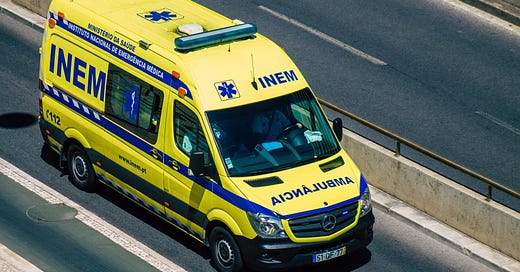Seven people reportedly killed by delays on emergency services
Pre-hospital emergency technicians from the National Institute of Medical Emergency are on strike to demand a career review and better pay conditions.
What?
Seven people have reportedly died in the last week as a result of the strike by pre-hospital emergency technicians from the National Institute for Medical Emergencies (INEM).
Over the long weekend of November 1, there were several problems with the service, which ended up in the death of two people, and the situation worsened on Monday, when the strike coincided with the civil service strike.
On that day, the strike by pre-hospital emergency technicians forced 44 emergency services to stop in the country during the afternoon shift, aggravating delays in answering the 112 line.
There are now reports of at least five more fatal cases on Monday due to delays in answering the Urgent Care Centre (CODU), bringing the total so far to seven, which has already led INEM to announce changes to pre-hospital assistance, ideally to go ahead next week.
The cases occurred in Bragança, Tondela, Almada, Cacela Velha, Vendas Novas, Castelo de Vide and Ansião.
UPDATE: The strike was suspended late on Thursday afternoon after an agreement was reached between the union and the Government.
Prime Minister’s reaction
On Thursday, PM Luís Montenegro admitted that there was a “serious situation” at the National Institute for Medical Emergencies (INEM), and that the response needed to be reinforced, saying that he hoped the strike would be demobilised and service regularised.
“First of all, let me tell you that we are not sure that the deaths occurred because of INEM’s lack of response capacity or the delay in answering calls, [but] the truth is that, at the moment, there is (…) a serious need to reinforce INEM’s response capacity,” declared Montenegro.
Speaking to Portuguese journalists in Budapest, where a summit of the European Political Community and an informal European Council, the Prime Minister assured that his Executive is “committed to, very quickly, to end the strike that is underway”.
Background
The protest began on 30 October. The technicians demanded a career review and better pay conditions.
One of the worst incidents took place on Monday, in Cacela Velha, Algarve, where a 77-year-old man died after a long period waiting for medical assistance.
According to his family, the ambulance took around an hour and forty minutes to arrive at the scene. At least four people tried unsuccessfully to call 112 and a neighbour contacted the Vila Real do Santo António fire brigade directly.
INEM has already confirmed the impact of the strike and recommended that people don’t hang up their calls until they’ve been answered and announced a reinforcement of the Integrated Medical Emergency System with 10 rescue ambulances, distributed among Medical Emergency Stations in fire stations and branches of the Portuguese Red Cross.




